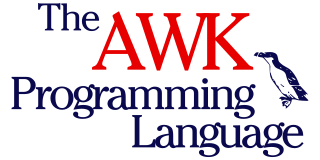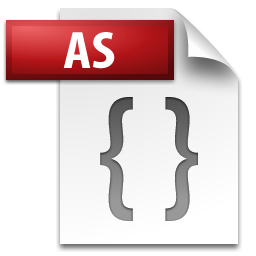
AWK (awk) is a domain-specific language designed for text processing and typically used as a data extraction and reporting tool. Like sed and grep, it is a filter, and is a standard feature of most Unix-like operating systems.
ABC are the first three letters of the Latin script known as the alphabet.

sed is a Unix utility that parses and transforms text, using a simple, compact programming language. It was developed from 1973 to 1974 by Lee E. McMahon of Bell Labs, and is available today for most operating systems. sed was based on the scripting features of the interactive editor ed and the earlier qed. It was one of the earliest tools to support regular expressions, and remains in use for text processing, most notably with the substitution command. Popular alternative tools for plaintext string manipulation and "stream editing" include AWK and Perl.

Script Creation Utility for Maniac Mansion (SCUMM) is a video game engine developed at Lucasfilm Games, later renamed LucasArts, to ease development on their graphic adventure game Maniac Mansion (1987). It was subsequently used as the engine for later LucasArts adventure games.
AppleScript is a scripting language created by Apple Inc. that facilitates automated control over scriptable Mac applications. First introduced in System 7, it is currently included in all versions of macOS as part of a package of system automation tools. The term "AppleScript" may refer to the language itself, to an individual script written in the language, or, informally, to the macOS Open Scripting Architecture that underlies the language.

Clean is a general-purpose purely functional computer programming language. It was called the Concurrent Clean System, then the Clean System, later just Clean. Clean has been developed by a group of researchers from the Radboud University in Nijmegen since 1987.

Apache Ant is a software tool for automating software build processes which originated from the Apache Tomcat project in early 2000 as a replacement for the Make build tool of Unix. It is similar to Make, but is implemented using the Java language and requires the Java platform. Unlike Make, which uses the Makefile format, Ant uses XML to describe the code build process and its dependencies.

ActionScript is an object-oriented programming language originally developed by Macromedia Inc.. It is influenced by HyperTalk, the scripting language for HyperCard. It is now an implementation of ECMAScript, though it originally arose as a sibling, both being influenced by HyperTalk. ActionScript code is usually converted to byte-code format by the compiler.

JSON is an open standard file format and data interchange format that uses human-readable text to store and transmit data objects consisting of attribute–value pairs and arrays. It is a common data format with diverse uses in electronic data interchange, including that of web applications with servers.
A webform, web form or HTML form on a web page allows a user to enter data that is sent to a server for processing. Forms can resemble paper or database forms because web users fill out the forms using checkboxes, radio buttons, or text fields. For example, forms can be used to enter shipping or credit card data to order a product, or can be used to retrieve search results from a search engine.
Clean URLs, also sometimes referred to as RESTful URLs, user-friendly URLs, pretty URLs or search engine-friendly URLs, are URLs intended to improve the usability and accessibility of a website or web service by being immediately and intuitively meaningful to non-expert users. Such URL schemes tend to reflect the conceptual structure of a collection of information and decouple the user interface from a server's internal representation of information. Other reasons for using clean URLs include search engine optimization (SEO), conforming to the representational state transfer (REST) style of software architecture, and ensuring that individual web resources remain consistently at the same URL. This makes the World Wide Web a more stable and useful system, and allows more durable and reliable bookmarking of web resources.
TypeScript is a free and open source programming language developed and maintained by Microsoft. It is a strict syntactical superset of JavaScript and adds optional static typing to the language. It is designed for the development of large applications and transpiles to JavaScript. As it is a superset of JavaScript, existing JavaScript programs are also valid TypeScript programs.
Game Editor is a 2D game authoring package. It supports multi-platform development to iPhone, iPad, Mac OS X, Windows, Android, Linux, Windows Mobile-based Smartphones, GP2X, Pocket PCs, and Handheld PCs. Compatibility with these platforms is mentioned on Game Discovery, a popular site for game developers, among other software like The 3D Gamemaker, DarkBASIC, and GameMaker.
A scripting language or script language is a programming language that is used to manipulate, customize, and automate the facilities of an existing system. Scripting languages are usually interpreted at runtime rather than compiled.
psake is a domain-specific language and build automation tool written in PowerShell to create builds using a dependency pattern similar to Rake or MSBuild. It intends to simplify the build language as compared to MSBuild scripting.
This page is based on this
Wikipedia article Text is available under the
CC BY-SA 4.0 license; additional terms may apply.
Images, videos and audio are available under their respective licenses.





